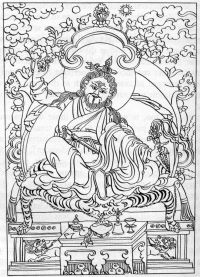Sherik Dorje Nӧnpo Gyü
Sherik Dorje Nӧnpo Gyü, The Sharp Vajra of Awareness Tantra (Wyl. shes rig rdo rje rnon po'i rgyud) is one of the five Dzogchen tantra termas revealed by Dudjom Lingpa through a pure vision.
目錄
Revelation of the terma
Being part of the Daknang Yeshe Drawa cycle, the Sherik Dorje Nӧnpo Gyü’s full name is 'The Sharp Vajra of Awareness Tantra, from the Matrix of Pure Appearances and Primordial Consciousness, the Quintessence of the Great Mystery of the Mantrayana, The Primordialy Pure Absolute Space of Samanthabadri, the Spontaneously Actualized Treasury of Liberation’ (Wyl. dag snang ye shes drwa ba las/ ka dag kun tu bzang mo'i dbyings/ lhun grub rdzogs pa chen po'i mdzod/ shes rig rdo rje rnon po'i rgyud/ gsang chen snags kyi yang bcud).
The Sherik Dorje Nӧnpo Gyü recounts how Dudjom Lingpa experienced Kuntuzangpo directly in a vision, giving teachings and answering questions to his own emanation's retinue of bodhisattvas. According to Alan Wallace[1]:
- The Teacher, Kuntunzangpo appearing as the Lake-Born Vajra, explains to Dudjom Linpa how all the wordly appearanes and mindsets we take to be real actually manifest like apparitions — reified by our grasping—without even an atom of true existence. But the sharp vajra’s power and blessings bring natural liberation, whereby all phenomena are recognized as spontaneously actualized displays of primordial consciousness. To accomplish this level of realization, we are instructed to focus on the essential points of practice, clearly distinguished in succinct terms.
Outline
The text has eight chapters:
- Taking the Impure Mind as the Path
- Revealing Your Own Face as the Sharp Vajra of Vipassana
- Revealing the Ground Dharmakaya
- Determining the Characteristics and Qualities of the Ground
- Determining Secret Dualistic Grasping and Revealing The Way of Natural Liberation
- Teachings on the Essential Points of Practice and Their Key Distinctions
- How to Follow the Path of the Great Clear Light, Direct Crossing Over
- How to Dwell in the Ground of Being
According to Alan Wallace[2]:
- A master piece of profundity and brevity, the “Sharp Vajra of Awareness Tantra” presents the complete path to perfect enlightenment in a mere 250 lines in the original Tibetan. Composed in crisply elegant verses to facilitate memorization and daily recitation, this tantra is a poetic encapsulation of the Dzogchen view, meditation and conduct. The ‘sharp vajra’ is discerning wisdom that recognizes all phenomena to be empty of inherent existence, demolishing the mountains of our concepts and collapsing the false shelters we erect out of hope and fear. This consumption of pristine awareness is present in the ground of being, which transcends all extremes of conceptual elaboration and is called the Great Perfection. All spiritual vehicles and fruitions are subsumed within the primordial consciousness that knows reality as it is and perceives the full range of phenomena
Propagation
Pema Tashi, a major student of Dudjom Lingpa, composed a 126-page commentary to the Sherik Dorje Nönpo Gyü which is called Drel Chung Dön Sal Nyingpo (Wyl. shes rig rdo rje rnon po'i rgyud kyi 'grel chung don gsal snying po).
Nyoshul Khen Rinpoche wrote: "Dudjom Rinpoche studied the tantra Sherik Dorje Nӧnpo Gyü, and the dynamic energy of his awareness welled up as the sublime knowing that discerns the true nature of phenomena. He easily and very naturally understood the difficult points of the vast lasses of tantras of the Vajrayana path"[3].
Commentaries
- Drel Chung Dön Sal Nyingpo, by Pema Tashi.
Translations
- Alan Wallace, Dudjom Lingpa’s Visions of the Great Perfection, Wisdom Publications, 2015, volume 1, page 27-38.
Notes
- ↑ Alan Wallace, Dudjom Lingpa’s Visions of the Great Perfection, Wisdom Publications, 2015, volume 1, page 22.
- ↑ Alan Wallace, Dudjom Lingpa’s Visions of the Great Perfection, Wisdom Publications, 2015, volume 1, page 21.
- ↑ Nyoshul Khenpo, A Marvelous Garland of Rare Gems: Biographies of Masters of Awareness in the Dzogchen Lineage (Junction City: Padma Publications, 2005), p. 284.
